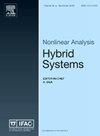STL and wSTL control synthesis: A disjunction-centric mixed-integer linear programming approach
IF 3.7
2区 计算机科学
Q2 AUTOMATION & CONTROL SYSTEMS
引用次数: 0
Abstract
This paper introduces an efficient optimization-based control synthesis methodology tailored for Signal Temporal Logic (STL) and its extension, weighted Signal Temporal Logic (wSTL). While STL captures Boolean and temporal operators, wSTL further allows users to express preferences and priorities over concurrent and sequential tasks denoted by weights over logical and temporal operators along with satisfaction times. The proposed approach utilizes Mixed Integer Linear Programming (MILP) for synthesis with both STL and wSTL formulae. We introduce efficient disjunction-centric encodings for STL and wSTL that capture both qualitative and quantitative semantics. This encoding minimizes the number of variables and constraints necessary to represent STL and wSTL formulae by efficiently handling conjunction operations (e.g., conjunction, always operators) and only introducing variables when disjunction operations are used (e.g., disjunction, eventually). Multiple case studies are conducted to demonstrate the proposed methodology’s operation and computational efficiency for the control synthesis with STL and wSTL specifications. While non-linear dynamics and predicates can be considered using piecewise linear functions, this work focuses on linear predicates and dynamics. We show how cost functions involving potentially conflicting objectives expressed in terms of states, controls, and satisfaction robustness impact the solutions to the control synthesis problem for STL and wSTL. We conduct a sensitivity analysis of weights used in wSTL formulae, offering detailed insights into how these weights modulate solutions for given formulae. Finally, the time performance of the disjunction-centric encodings for both STL and wSTL is compared against state-of-the-art frameworks, comprehensively evaluating their efficiency and practical applicability.
STL和wSTL控制综合:一种以析取为中心的混合整数线性规划方法
本文介绍了一种为信号时序逻辑(STL)及其扩展加权信号时序逻辑(wSTL)量身定制的有效的基于优化的控制综合方法。虽然STL捕获布尔运算符和时间运算符,但wSTL进一步允许用户表达对并发和顺序任务的偏好和优先级,这些任务由逻辑和时间运算符的权重以及满足时间表示。该方法利用混合整数线性规划(MILP)对STL和wSTL公式进行综合。我们为STL和wSTL引入了高效的以析取为中心的编码,以捕获定性和定量语义。这种编码通过有效地处理连接操作(例如,连接,总是操作符)和只在使用分离操作(例如,disjunction,最终)时引入变量来最小化表示STL和wSTL公式所需的变量和约束的数量。进行了多个案例研究,以证明所提出的方法在与STL和wSTL规范的控制综合方面的操作和计算效率。虽然可以使用分段线性函数考虑非线性动态和谓词,但本工作侧重于线性谓词和动态。我们展示了包含以状态、控制和满意度鲁棒性表达的潜在冲突目标的成本函数如何影响STL和wSTL的控制综合问题的解决方案。我们对wSTL公式中使用的权重进行了敏感性分析,提供了这些权重如何调节给定公式的解决方案的详细见解。最后,将以析取为中心的STL和wSTL编码的时间性能与最先进的框架进行了比较,全面评估了它们的效率和实用性。
本文章由计算机程序翻译,如有差异,请以英文原文为准。
求助全文
约1分钟内获得全文
求助全文
来源期刊

Nonlinear Analysis-Hybrid Systems
AUTOMATION & CONTROL SYSTEMS-MATHEMATICS, APPLIED
CiteScore
8.30
自引率
9.50%
发文量
65
审稿时长
>12 weeks
期刊介绍:
Nonlinear Analysis: Hybrid Systems welcomes all important research and expository papers in any discipline. Papers that are principally concerned with the theory of hybrid systems should contain significant results indicating relevant applications. Papers that emphasize applications should consist of important real world models and illuminating techniques. Papers that interrelate various aspects of hybrid systems will be most welcome.
 求助内容:
求助内容: 应助结果提醒方式:
应助结果提醒方式:


